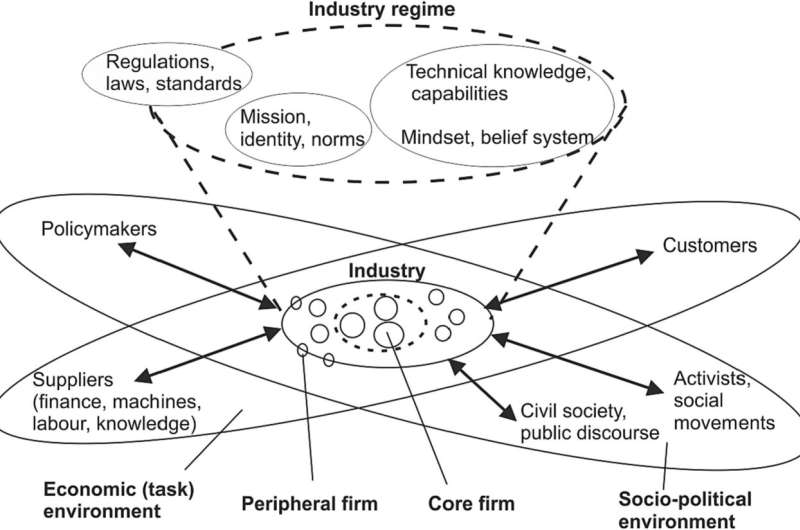
MIOIR Researchers Professor Frank Geels and Dr. Julian Gregory conducted a longitudinal analysis of coevolving contexts and company strategies in the U.K. steel industry. While the existing literature makes important analyses of the technical and economic dimensions of decarbonization pathways, it gives less attention to real-world implementation processes by the large energy intensive industries (LEIIs), such as steelmaking, who will actually have to make the investment decisions about the deployment of the low-carbon technologies.
This is particularly pertinent, as these same industries are facing challenging economic conditions because they operate within a global industries where the emergence of new firms has substantially increased competitive pressures on the U.K.’s established actors, leading to their declining output and increasing losses. This represents a gap in the decarbonization analysis which requires appreciation.
For the U.K.’s steel industry therefore, we assessed the speed and directionality of its low-carbon transition, by applying a longitudinal analysis of changing external pressures and company response strategies over the last 34 years. Applying the Triple Embeddedness Framework and a five-phase model of reorientation, our study finds that the steel industry’s low-carbon reorientation strategies moved from inaction (phase 1 in our model) and incremental change (phase 2) in the 1988–1997 period, to hedging and exploration of technical alternatives (phase 3) in the 1997–2007 period, back to incremental change in the 2007–2015 period (phase 2), and then forward again to hedging and exploration of technical alternatives (phase 3) in the 2015–2022 period.
The reason for this oscillation pattern is that economic decline and successive retrenchment strategies reduced managerial attention and organizational resources for low-carbon orientation, especially after the 2007/8 financial crisis which led to a survival-focus. In recent years, U.K. steelmakers have started to explore three decarbonization pathways (carbon-capture-and-storage, electric arc furnaces using scrap feedstock, and electric arc furnaces using hydrogen direct reduced feedstock) but have not yet committed to their deployment, which is why reorientation speed is limited.
New economic headwinds in 2021/2 threaten the implementation of low-carbon visions and roadmaps, leading steelmakers to ask for more government support. Future shifts to phase 4 (deployment and diversification) and phase 5 (full reorientation) in our conceptual model will depend on the outcome of currently ongoing political negotiations.
More information:
Frank W. Geels et al, Low-carbon reorientation in a declining industry? A longitudinal analysis of coevolving contexts and company strategies in the UK steel industry (1988–2022), Energy Research & Social Science (2023). DOI: 10.1016/j.erss.2023.102953
Citation:
Low-carbon reorientation in the declining steel industry (2023, January 23)
retrieved 23 January 2023
from https://techxplore.com/news/2023-01-low-carbon-reorientation-declining-steel-industry.html
This document is subject to copyright. Apart from any fair dealing for the purpose of private study or research, no
part may be reproduced without the written permission. The content is provided for information purposes only.
For all the latest Technology News Click Here
For the latest news and updates, follow us on Google News.
